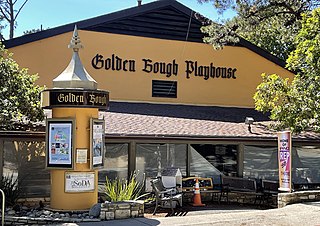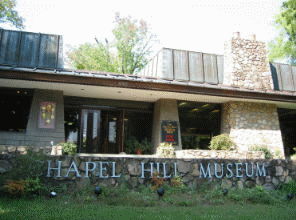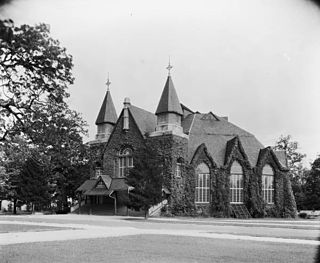

Carolina Performing Arts is the name adopted by the UNC Office of the Executive Director for the Arts, the department responsible for the planning and promotion of the performing arts program, and for venues such as Memorial Hall, Historic Playmakers Theatre, and Gerrard Hall on the University's campus. [1]
PlayMakers Repertory Company is the fully professional theater company of the UNC Department of Dramatic Art. The Company's seasons run from September to April and include both classical and contemporary performances, as well as ongoing educational programs. [2]
The name of the Company is derived from the Carolina Playmakers, a theatre group at the University founded in 1918, who played a significant role in developing folk drama in the United States. [2] The modern "PlayMakers" was formed in 1978. [2]

The original Memorial Hall was commissioned in 1883, when Gerrard Hall was deemed too small for the University's commencement ceremonies. Planned as a memorial to former president David Lowry Swain and alumni lost during conflicts such the Civil War, the building was financed by sale of marble tablets dedicated in their name. However, in 1929, the structure was condemned as structurally unsound and demolished. The replacement Memorial Hall opened in 1931 with only the marble tablets retained. After an $18 million refurbishment between 2002 and 2005, the venue currently hosts music, dance, theater, and lectures by invited speakers. [3]

Historic Playmakers Theatre is a Greek Revival temple built in 1850, that was originally designed by New York architect Alexander Jackson Davis as Smith Hall, a combined library and ballroom. [4] After also being used as a laboratory, bath house, and law school, it became a theater in 1923. The Theatre is the perpetual home of the Carolina Playmakers, although their successor, the Playmakers Repertory Company, uses the Paul Green Theatre as their primary venue. [5] [6] It was added to the National Register of Historic Places in 1971 and designated a National Historic Landmark in 1973. [4]
The Paul Green Theatre is a modern 500-seat venue located within the UNC Center of Dramatic Art. [7] Named for Pulitzer Prize-winning playwright and author Paul Green, the Theatre opened in 1978. [8] Elizabeth Price Kenan Theatre is an extension to the main theater with a capacity of 200. [9]

The University of North Carolina at Chapel Hill is a public research university in Chapel Hill, North Carolina. After being chartered in 1789, the university first began enrolling students in 1795, making it one of the oldest public universities in the United States.
PlayMakers Repertory Company is the professional theater company in residence at the University of North Carolina at Chapel Hill. PlayMakers Repertory Company is the successor of the Carolina Playmakers and is named after the Historic Playmakers Theatre. PlayMakers was founded in 1976 and is affiliated with the Dramatic and performing arts at the University of North Carolina at Chapel Hill. The company consists of residents, guest artists, professional staff and graduate students in the Department for Dramatic Arts at UNC and produces seasons of six main stage productions of contemporary and classical works that run from September to April. PlayMakers Repertory Company has a second stage series, PRC², that examines controversial social and political issues. The company has been acknowledged by the Drama League of New York and American Theatre magazine for being one of the top fifty regional theaters in the country. PlayMakers operates under agreements with the Actors' Equity Association, United Scenic Artists, and the Society of Stage Directors and Choreographers.
Ray Dooley is a company member at the PlayMakers Repertory Company in Chapel Hill, North Carolina, and has performed on Broadway, film and television. He is currently the head of the Professional Actor Training Program (PATP) at the University of North Carolina Chapel Hill (UNC) and is a drama faculty member.

The Pacific Repertory Theatre is a non-profit California corporation, based in Carmel-by-the-Sea, California, that produces theatrical productions and events, including the annual Carmel Shakespeare Festival. It is one of eight major arts institutions in Monterey County, as designated by the Community Foundation of Monterey County, and is supported in part by grants from the David and Lucile Packard Foundation, The Shubert Foundation, the Berkshire Foundation and the Monterey Peninsula Foundation.

Martin Marietta Center for the Performing Arts is the premier location for cultural arts and entertainment in Raleigh, North Carolina. The center consists of four unique venues, Raleigh Memorial Auditorium, Meymandi Concert Hall, A.J. Fletcher Opera Theater, and Kennedy Theatre.

The Golden Bough Playhouse is a historic three-story theatre in Carmel-by-the-Sea, California on Monte Verde St., between 8th and 9th Avenues. The playhouse occupies the site of the former Carmel Arts and Crafts Club, Carmel's first cultural center and theatre, built in 1906–1907 on Casanova Street, and the Arts and Crafts Hall, built in 1923–1924 on an adjacent lot on Monte Verde Street. Since 1994, the facility has been owned and operated by Pacific Repertory Theatre, Monterey County's only year-round professional theatre company. A two-phase renovation of the aging facility began with an interior building project in 2011. A second phase project, including both interior and exterior renovations, is scheduled for 2023-2024. The theatre was recorded with the National Register of Historic Places on July 3, 2002. It is significant as a California historic building because it is located on the original site of the Carmel Arts and Crafts Club and Hall, the oldest indoor performing arts venues in Carmel.
David Hammond is an American director and acting teacher. He trained for the theatre at the American Academy of Dramatic Arts and received his M.F.A. from the Carnegie Mellon University Drama Department. He did his undergraduate studies at Harvard University and graduated magna cum laude with a concentration in Elizabethan literature. He taught at the Juilliard School, the American Conservatory Theater, and the Yale School of Drama and later became the artistic director of the PlayMakers Repertory Company.

Stages (Houston) is a theatre company in the city of Houston, Texas formerly known as Stages Repertory Theatre. It produces performances at The Gordy, the company's three-stage venue that opened in 2020 in Houston's Montrose neighborhood. The Houston Chronicle called it "the equivalent of off-Broadway in Houston".
The Lost Colony is an historical outdoor drama, written by American Paul Green and produced since 1937 in Manteo, North Carolina. It is based on accounts of Sir Walter Raleigh's attempts in the 16th century to establish a permanent settlement on Roanoke Island, then part of the Colony of Virginia. The play has been performed in an outdoor amphitheater located on the site of the original Roanoke Colony in the Outer Banks. More than four million people have seen it since 1937. It received a special Tony Honors for Excellence in Theatre award in 2013.
Emil J. Kang serves as Program Director for Arts and Cultural Heritage at The Andrew W. Mellon Foundation where he leads the Foundation’s grant making program. Kang assumed the role in 2019.

High School Musical on Stage! is a musical based on the 2006 Disney Channel Original Movie High School Musical, with music and lyrics by Matthew Gerrard, Robbie Nevil, Ray and Greg Cham, Drew Seeley, Randy Petersen, Kevin Quinn, Andy Dodd, Adam Watts, Bryan Louiselle, David N. Lawrence, Faye Greenberg and Jamie Houston, and a book by David Simpatico. It quickly became a popular choice for high school musical theater productions.

The Music Hall Center for Performing Arts is a 1,731-seat theatre located in the city's theatre district at 350 Madison Street in Downtown Detroit, Michigan. It was built in 1928 as the Wilson Theatre, designated a Michigan State Historic Site in 1976, and was listed on the National Register of Historic Places in 1977.

Brian Sidney Bembridge is an American scenic, lighting, and costume designer for theater and film. His work has been seen on stages and screens throughout the country and Internationally in Australia, Germany, Prague, Ireland, and Great Britain. Mr. Bembridge has also taught and lectured at many universities across the country. He holds a BFA from University of North Carolina School of the Arts.

The Playmakers Theatre, originally Smith Hall, is a historic academic building on the campus of the University of North Carolina at Chapel Hill. Built in 1850, it was designated a National Historic Landmark for its architecture, as an important example of Greek Revival architecture by Alexander Jackson Davis. It is now a secondary venue of the performing company, which is principally located at the Paul Green Theatre in the Joan H. Gillings Center for Dramatic Art.

The Durham Performing Arts Center opened November 30, 2008 as the largest performing arts center in the Carolinas at a cost of $48 million. The DPAC hosts over 200 performances a year including touring Broadway productions, high-profile concert and comedy events, family shows and the American Dance Festival. Operated under the direction of Nederlander and Professional Facilities Management (PFM), DPAC has twice been listed as the #1 performing arts organization in the Triangle region by the Triangle Business Journal. Construction of the DPAC was part of a larger plan to redevelop downtown Durham by the Capitol Broadcasting Company, and includes other nearby properties such as the American Tobacco Historic District, the Durham Bulls Athletic Park, and the studios of the CBC-owned Fox 50 TV station.

Chapel Hill Museum was a local cultural and historical museum in Chapel Hill, North Carolina. The museum was founded in 1996 by leaders of the Town of Chapel Hill's Bicentennial Committee and celebrated its 10th anniversary in 2006. In the decade since its founding, Chapel Hill Museum averaged over 20,000 visitors a year and provided education programs to over 3,500 local students a year. The museum closed on July 11, 2010.
Pitt Stages', previously known as the "University of Pittsburgh Stages" orUniversity of Pittsburgh Repertory Theatre or Pitt Rep, is the flagship production company for the University of Pittsburgh Department of Theatre Arts. Pitt Stages features students on stage with professional actors and teaching artists staging public performances of classic masterpieces, contemporary productions, and student-directed labs. The company's primary performance spaces include the University's Stephen Foster Memorial and Cathedral of Learning.
The performing arts in Detroit include orchestra, live music, and theater, with more than a dozen performing arts venues. The stages and old time film palaces are generally located along Woodward Avenue, the city's central thoroughfare, in the Downtown, Midtown, and New Center areas. Some additional venues are located in neighborhood areas of the city. Many of the city's significant historic theaters have been revitalized.

Memorial Hall was initially built in 1883 to be used for events like commencement ceremonies and the first ever basketball games at the University of North Carolina at Chapel Hill. The architect, Samuel Sloan, designed the building to be larger than the previously used Gerrard Hall so that it could hold up to 4,000 people. Memorial Hall was created to honor the men at the university who fought in the Civil War and to commemorate some of the important antebellum figures at the University of North Carolina. Specifically David L. Swain was one of the men honored in the making of the building. Funding for Memorial Hall was initially provided by selling marble tablets that were dedicated to certain men who fell in battle during the Civil War. The tablets still exist and are kept on display at the current Memorial Hall.